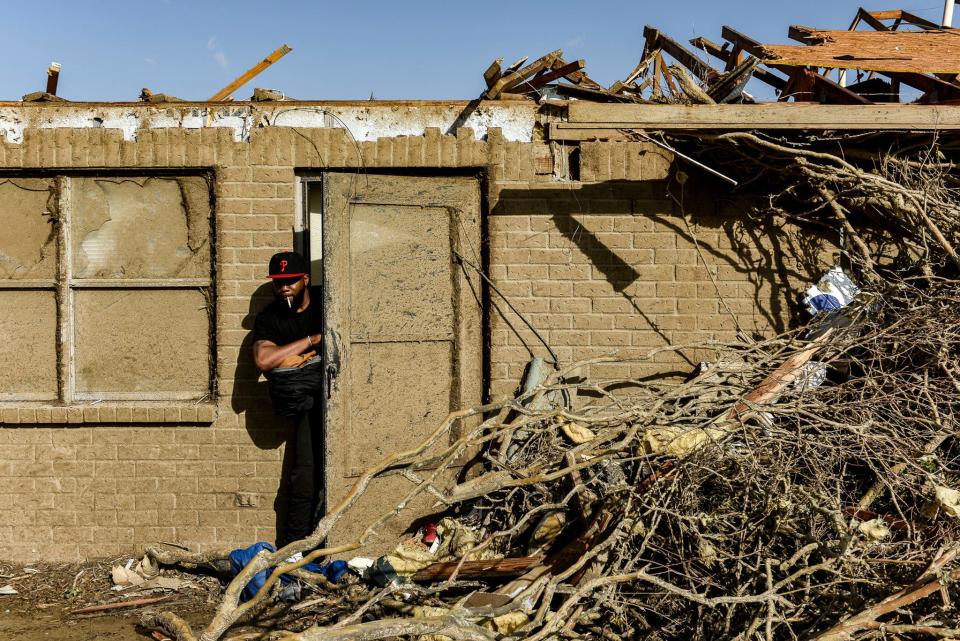Does homeowners' insurance cover tornado damage? How to prepare before a disaster
Severe storms and tornadoes pummeled the Mississippi Delta region on Friday night, killing at least 26 people and leveling homes, flipping cars and knocking out power as it left a trail of destruction across Mississippi and Alabama.
Homeowners likely will face a long road to recovery, depending on the severity of the property damage.
Each year, about 1,200 tornadoes with wind speeds as high as 300 mph touch down in the United States, according to the National Oceanic and Atmospheric Administration. Since 1980, the U.S. has experienced 298 weather and climate disasters in which overall costs reached or exceeded $1 billion.
Weather-related disasters, fueled by climate change, have increased fivefold in the past 50 years, according to a recent report by the World Meteorological Organization.
Here's what homeowners should know about their coverage before disaster strikes:
Does homeowners insurance cover tornado damage?
Standard homeowners and business insurance policies cover wind damage caused by tornadoes and severe weather. Homeowners' insurance policies also provide coverage for additional living expenses policyholders will need to finance temporary housing costs and other daily necessities. Damage to vehicles is covered under the comprehensive section of standard auto insurance policies, which is optional, according to the Insurance Information Institute.
SVB: Close to 190 banks could face Silicon Valley Bank's fate, according to a new study
HOUSING MARKET: Home prices are finally declining, ending longest streak in growth. Who are the homebuyers?
What are things usually not covered by home insurance?
While standard homeowners’ policies cover a range of disasters, from tornadoes to lightning strikes to winter storm damage, they do not cover floods, earthquakes, maintenance damage and sewer backup, experts say.

“Earthquake and flood insurance are often overlooked types of policies that can leave families without any financial way to recover or rebuild,” says Leslie Chapman-Henderson, CEO of the Federal Alliance for Safe Homes, an advocacy group that works to strengthen homes from natural and human-made disasters.
When a natural disaster strikes, what can homeowners do?
First, contact a restoration company, says Tom Dolfay, CEO of Property Damage Appraisers, a company that assesses disaster-related damages for major insurance companies across the U.S.
Restoration companies assess the extent of the damage and determine the best course of action following significant damage from floods, fires, and other catastrophic events. They work with insurance companies and can assist in protecting the home from further damage.
Build connections with local restoration companies as soon as you buy a home so that when disaster strikes, you know whom to call. You might also get a better idea of what the repairs could actually cost if the insurance company tries to lowball you, says Dolfay.
Does your insurance cover 'replacement cost' or 'actual cash value'
Read the fine print and know the difference.
Replacement cost pays for the full amount needed to replace an item, whereas actual cash value insurance estimates depreciation, or the loss of value over time, and pays only the difference.
A homeowner with actual cash value insurance who needs to replace floors, walls, windows, appliances, roof, or lighting following a major event, could end up spending a substantial amount of money trying to rebuild their house. The actual cash value option could work better for items such as fine jewelry and art that can gain value over time.
PROPERTY INSURANCE: How much do you need?
GETTING A HOME POLICY: What are the best companies?
Keep an inventory of what’s in your house
"Know the make, model and brand of your major appliances and valuable items. Take pictures of everything (before disaster strikes) when you are calm, cool and collected, and email them to yourself so you can access them from anywhere," says Dolfay.
Be aware of insurance coverage limitations
Chapman-Henderson, of FLASH, suggests contacting more than one company for quotes and paying attention to coverage limitations and special riders a homeowner may need to cover high-value items like jewelry or heirlooms.
“Ask about the coverage limits, deductibles, and exclusions for each disaster risk common in your area,” she says.
Swapna Venugopal Ramaswamy is a housing and economy correspondent for USA TODAY. You can follow her on Twitter @SwapnaVenugopal and sign up for our Daily Money newsletter here.
This article originally appeared on USA TODAY: Does home insurance cover tornado damage? How can homeowners prepare

 money
money 